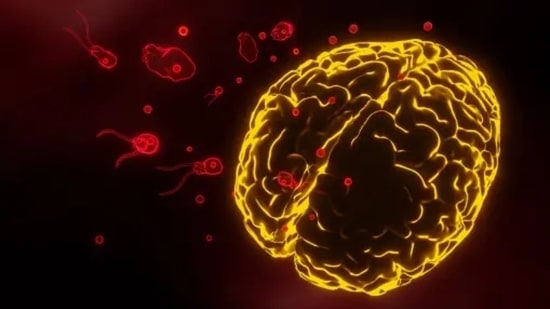
What is brain-eating amoeba that killed teen in Kerala; know how to be safe, early signs and prevention tips
5 months ago | 43 Views
The state of Kerala reported its fourth fatality due to a rare microorganism – brain-eating amoeba. Scientifically known as Naegleria fowleri, these microorganisms live in freshwaters and enter the human body, severely impacting the brain. Warm freshwater environments such as lakes, rivers, and hot springs make amicable spaces for brain-eating amoeba to thrive. People are advised to stay away from water activities in order to stay safe.
In an interview with HT Lifestyle, Dr Preetha, consultant neurologist at Prashanth Hospitals, Chennai, said, “Primary Amoebic Meningoencephalitis (PAM) is a very rare but fatal infection caused by Naegleria fowleri, commonly known as the brain-eating amoeba. This microscopic amoeba basically thrives in warm freshwater environments where water is mostly stagnated and not flowing, which thereby poses a significant health risk when contaminated water enters the nose and travels to the brain, leading to severe tissue damage and brain swelling.”
Early symptoms:
The initial and early signs of PAM can easily be mistaken for common viral illnesses, making early diagnosis challenging. Headache, fever, nausea and vomiting in the initial stages can be very mild. As the infection progresses, more severe symptoms may develop, such as stiff necks, confusion or eventually seizures, hallucinations and coma in extreme cases. The disease advances rapidly, often resulting in death within days of the onset of symptoms. Prompt medical attention is crucial, but even with treatment, the prognosis is typically poor.
How to keep children safe?
Children are the most affected target groups, and minimizing exposure to the conducive environments like avoiding warm freshwater areas, keeping heads above water in thermal pools, frequent and regular chlorination in pools, using proper cover and clips and effective supervision of children while playing in pools will be effective in protecting children from these infections.
Things to remember:
PAM is extremely rare: Although the infection is severe, it is very uncommon.
No risk from drinking contaminated water: Naegleria fowleri infection cannot occur from drinking contaminated water or through person-to-person contact.
No established cure: Currently, there is no definitive cure for PAM, and the infection is usually fatal.
#




















